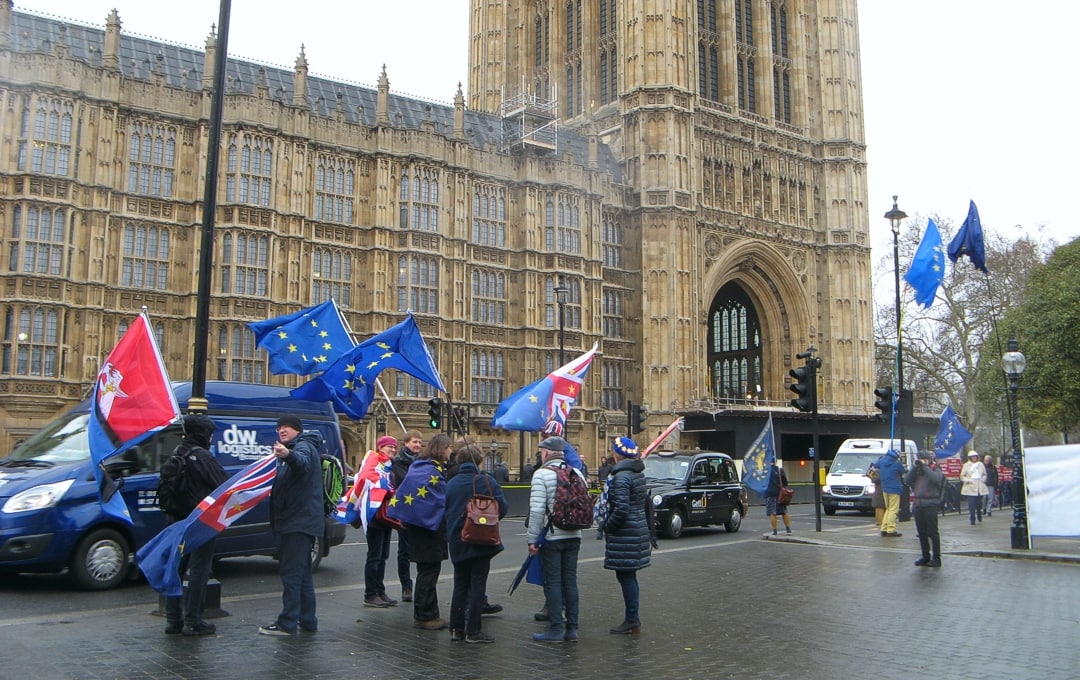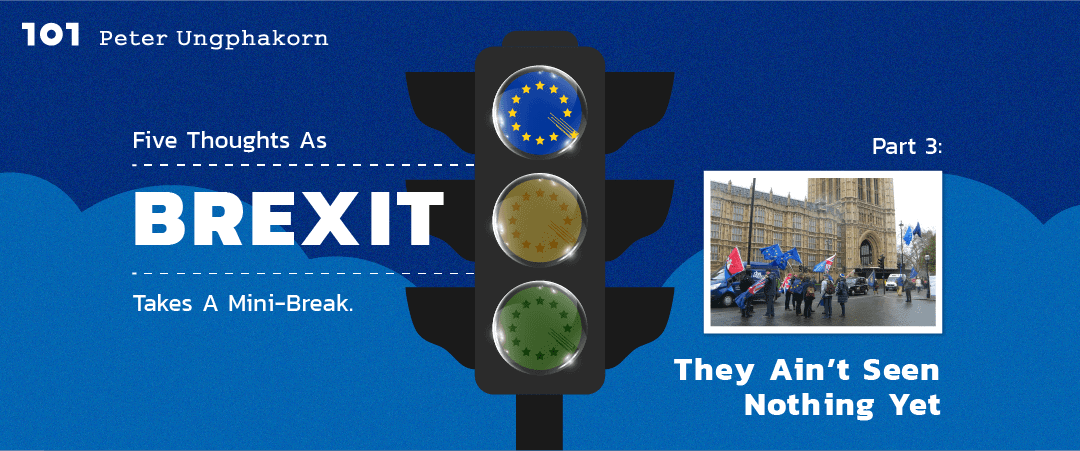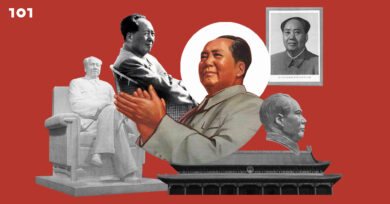Peter Ungphakorn Story
Papimol Lotrakul Illustration
[box]
Brexit has almost completely dominated British politics. A strange calm briefly interrupted months of hectic activity, but not for long. Peter Ungphakorn considers five lessons learnt so far. Part 3: They ain’t seen nothing yet
[/box]

For months, the United Kingdom’s chaotic efforts to set up its departure from the European Union (Brexit) saw almost daily twists and turns. Tension mounted and the British moved ever closer to crashing over the cliff-edge and out of the EU, with only the flimsiest of parachutes.
This is the third of five parts on thoughts on what happened in the last couple of years and on what lies ahead. Several have been discussed before. They all contain new developments:
- after all the frantic to-ing and fro-ing, almost nothing has changed for Britain
- nearly three years of political debate has failed to produce better-informed arguments
- if those past three years were bad, what lies ahead is going to be worse
- Theresa May’s handling has been disastrous but she might still get what she wants — just
- simplistic definitions of democracy and sovereignty are unhelpful
3. It can only get worse
The Withdrawal Agreement is only the first stage. It defines what the UK does for its departure — including payments due for the EU’s budget, preserving the rights of EU citizens in the UK and vice versa, the terms of a transition period for the UK and EU to negotiate their future relationship, and the backstop for avoiding infrastructure on the Irish border.
A shock is in store for many who are impatient for the UK to “just leave”. There is more and probably worse to come.
Many of the options in the House of Commons’ “indicative” votes were about the future relationship, not the Withdrawal Agreement — although the accompanying non-binding political declaration could be amended to include outlines of any agreed option.
Objections to the Withdrawal Agreement were over a handful of subjects, particularly the Irish backstop and the payment to the EU budget. If the Withdrawal Agreement is ever accepted, the differences over the future relationship will be about a much wider range of issues.
And as those “indicative” votes on March 27 and April 1 showed, not one single option has majority support in Parliament — no deal; a UK-EU customs union; a customs union plus closer relationship (Labour Party); even closer relationship similar to the Single Market but not a customs union (Common Market 2.0, similar to Norway but even closer), or staying in the EU (revoking Article 50).
Also on the agenda would the preference of hard Brexiters: a free trade agreement with the EU mainly covering goods, modelled on the EU-Canada agreement with some improved terms.
In the next stage we can expect an even harder battle over which of those choices to pick. Even if the UK can agree on one or two options to negotiate, further battles can be expected on the vast amount of detail affecting every single aspect of the economy. And that’s only the trading relationship.
The history of trade negotiations suggests the UK and EU stand little chance of reaching agreement within the proposed transition period — up to the end of 2020 (far too soon by any realistic assessment), extendable to the end of 2022.
The realistic prospect is the talks will drag on. And that means the transition period will too. This will more or less keep the UK in a customs union with the EU, and in many EU institutions during the period. The UK would no longer have decision-making power in those institutions, and it would still be subject to the EU Court of Justice, one of the objections of Brexiters.
“Why don’t they just get on with it?” is likely to be an even louder measure of the over-simplification.
__________________________
Previously: Dishonesty and trade-offs
Next: Is the Prime Minister the problem?
__________________________
Find out more
- Article 50 two years on (The UK in a Changing Europe, 2019)
- Negotiating Brexit: Preparing for talks on the UK’s future relationship with the EU (Institute for Government, 2019)
- Brexit: A Love Story? (Audio — a highly recommended series of BBC Radio Four podcasts, 2018–19)
__________________________
Previous articles on Brexit
- And I leave you with Brexit (again), as it heads into ever darker hours (December 21, 2018)
- Five days of mathematical impossibility in the parallel universe of Brexit (October 19, 2018)
- When complexity challenges public opinion and democracy. Part 3—Brexit, two years later (June 22, 2018)
- Can a UK-EU Brexit deal really emerge from this chaos? (June 27, 2017)
See also the author’s blog
Peter Ungphakorn is based on the shores of Lake Léman in Switzerland. He spent almost two decades with the WTO Secretariat, Geneva. Before that he worked for The Nation and the Bangkok Post. He now writes for IEG Policy on agricultural trade issues and blogs on trade, Brexit and other issues at https://tradebetablog.wordpress.com/. He tweets @CoppetainPU.



